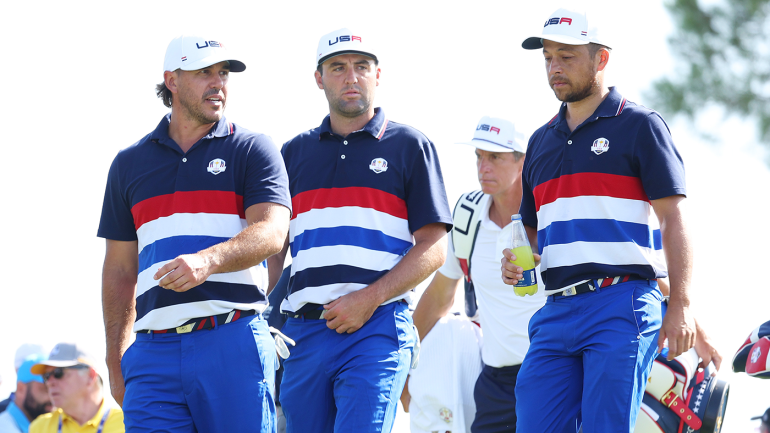
Something has changed for the United States Ryder Cup team.
Not necessarily in a way that guarantees the Americans will win their first road Ryder Cup in 30 years this weekend at Marco Simone Golf Club in Rome. However, it has become clear that if the United States does go down at the hands of Rory McIlroy, Jon Rahm and Viktor Hovland, the defeat will look quite a bit different than it has in the recent past.
What has changed is two-fold.
The most tangible an important (but less fun) difference is that the U.S. has gone deep on analytics, so much so that it has evened the advantage Europe has long enjoyed. Although details have been withheld, the idea of using analytics to improve their chances of winning is something being openly discussed by everyone, including captain Zach Johnson.
"We have had a group of individuals help us navigate the numbers and stats and data, if you will, since 2014 or 2015," Johnson said Monday. "It's just one element of how we organize our system, so yeah, you chew on it and you kind of ingest it, and you kind of figure out whether it's worthy of some of the numbers, and I guess you'd say results are worthy of implementing."
The U.S. is far more organized and detailed than in past years, which makes a massive difference over the course of the 28 matches that compose a Ryder Cup.
The more interesting switch is less mathematical and far more human: These 12 Americans like each other and get along better than past teams. Is that too simplistic? Perhaps.
"I played on a lot of those teams," Johnson recalled. "Unfortunately, three of them over here where, fortunately, the experience was amazing but the result was not what I anticipated. But every one of those teams, I wanted to be around the guys. From a camaraderie standpoint, that was not an issue. The passion was there."
However, one of Johnson's star players told a different story after the last Ryder Cup, which the U.S. won by 10 at Whistling Straits.
Brooks: “It’s a different group of guys. It’s a lot more fun than in years past.” 👀
— Kyle Porter (@KylePorterCBS) September 26, 2021
Some of what Brooks Koepka referenced was the fact that U.S. captains have allowed players to do their own thing throughout Ryder Cup weeks -- from gym sessions to naps to everything golfers do in normal tournament weeks. This allows the players to focus more on taking care of their own business as opposed to worrying about unfamiliar tasks.
"They've probably learned from past failures, maybe," said Koepka. "You've got to figure out what works. Different group of guys each time, so you've got to figure out what works for the majority or what works for most. They've done a really good job this week of letting us be us and do what makes us play well.
"From when I was on the team in '16, it was very structured [way] of there's a lot more things we had to do off the golf course, but they've definitely toned it back a little bit."
It runs deeper than that, though. It may not be as simplistic as the 12 Americans getting along better than before, but there is an element of galvanization, a through line of unification on this U.S. side that is difficult to dismiss. These guys -- 11 of whom are within eight years of one another with Brian Harman the lone outlier -- genuinely enjoy one another.
"It's a bit of a different dynamic here, and I think we crave that in a way," said Max Homa." You crave being around people that you want to root for and that you enjoy spending time with."
He continued: "That just bleeds into when you're playing. You have massive trust in the person you're playing with, not only because they're a great player but because you know they're going to hit bad shots, you're going to hit bad shots, shrug it off and keep going. So, that actually does play a large part in my mind."
This has been the European mindset for years. Americans have toyed with the idea -- Paul Azinger's captaincy in 2008 comes to mind -- but for the most part, Tom Watson's "nothing else matters, just make more birdies!" mantra from 2014 is more or less emblematic of a long era of losing road Ryder Cups.
Koepka agreed with Homa.
"It matters to me because it's a lot easier when you know that everyone has got your back," Koepka said. "Like you're playing for more than just yourself when we're teeing it up this week. When guys are out there, it's a lot -- it's always fun looking up -- I'm just throwing names, like I'm playing my match, and I see Xander following or whatever, it makes you just fight a little bit harder. It's a little bit more fun, and you're just trying to show off for those guys, too. That's some of the fun."
The obvious rebuttal is that this mentality was supposedly in place five years ago, yet the U.S. still got routed in France. However, that 2018 Ryder Cup included a course that was wonkily set up to the specific skillsets of the Europeans, and it also included Tiger Woods and Phil Mickelson. This will be the first road Ryder Cup the U.S. has played since, well, 1993 in which neither of them are on the team. Incidentally, that is also the last time the U.S. won in Europe.
Woods and Mickelson are great players, to be sure, but there is an idea that perhaps they sucked up too much of the oxygen in the team rooms. They weren't always the best with vulnerability and troop rallying, either. Vulnerability is a specific cultural (and perhaps generational) characteristic. Europe has always been more vulnerable with one another because it has always been more culturally appropriate for them to embrace that emotion.
"I don't mind being vulnerable."
— Ryder Cup Europe (@RyderCupEurope) September 27, 2023
Rory 💙@McIlroyRory | #TeamEurope pic.twitter.com/sY1PvEEZAD
In America -- and I'm speaking about life outside of golf -- vulnerability is often frowned upon, particularly for men and particularly for male athletes. But vulnerability and camaraderie -- all of the corny, goofy stuff you always hear folks talk about with tremendous emotion -- matters. How could it not in a team event like this?
But why does it matter? That's a question I have thought a lot when considering this event.
Koepka and Homa spoke to it. If there's a one-word summation of the entire ethos necessary to go win a team event like the Ryder Cup, it's "trust."
Trust leads to comfort (the goal of any golfer) in a Ryder Cup week, and trust is easier to achieve when vulnerability is present and relationships are strengthened. You would never fight as hard for a stranger as you would your best friend. You would never care as much about a stranger's opinion compared to that of a friend or relative.
The U.S. teams that came before may not have been comprised of strangers, but I'm dubious that they were as close-knit as these 12 men.
"It's just knowing that the team cares about you, and everyone does," added Collin Morikawa.
Of course, none of this -- the analytical advancement, the freedom for players during the week nor the shared enjoyment of friendship this team seems intent to carry -- will result in the U.S. getting to 14 points on Sunday afternoon and retaining the Ryder Cup.
All of it, however, gives the Americans a better chance (the best chance!) of finding harmony and producing a different result than the same one they've gotten for the last 30 years in Europe. The best news? Even if the ultimate result is not the one desired by the U.S., the path this team has taken is the right one.





















